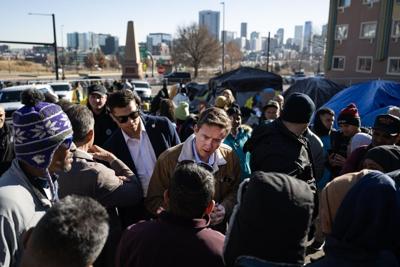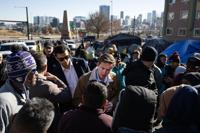Denverites are becoming second-class citizens in their own city. To varying degrees, that could be said of Coloradans in other communities, as well.
They have been elbowed aside by a new wave of immigrants — many from Venezuela — who have entered the U.S. illegally over the past year and have been deluging Denver and the rest of the state. The toll on taxpayers is growing daily.
Since December 2022, about 40,000 immigrants have arrived in Denver. Welcoming them has cost the city over $60 million and counting. The state and federal government have reimbursed Denver about $14 million, but the rest of the cost is coming out of the pockets of Denver taxpayers. That’s not even counting the tab handed to taxpayers in other Colorado cities.
That bill for covering food, shelter and other services to the droves of immigrants hasn’t been paid out of some rainy-day fund in City Hall’s coffers. It has come directly out of the city’s operating budget, resulting in slashed public services to locals — parks & rec centers that reduced their hours; DMV branches that went to weekly closures — basic functions that city taxpayers depend on.
And that’s not to mention the collateral damage caused by the immigration surge — from proliferating tent camps to rising crime.
Of course, it’s part of the price of living in a sanctuary for illegal immigration.
State lawmakers in 2019 enacted a law prohibiting local governments from cooperating with the federal government in immigration enforcement and prohibiting the sharing of judicial information with federal officials.
Last year, the Legislature passed a law barring local government involvement in immigration detention. Denver, meanwhile, is widely known for offering shelter, food and transportation of illegal immigrants to their final destination.
Now — at last — there are signs our sanctuary status is prompting second thoughts. As reported by our affiliate the Washington Examiner, Denver officials are starting to tell the immigrants to move on, given the city’s immigration-induced, multimillion-dollar deficit.
A video obtained by Gazette news partner 9News — shot inside an immigrant shelter — showed Denver Mayor Mike Johnston’s political director, Andres Carrera, telling a group of recently arrived immigrants in Spanish that there are better opportunities outside Colorado.
“The opportunities are over,” Carrera tells them. “New York gives you more. Chicago gives you more. So I suggest you go there where there is longer-term shelter. There are also more job opportunities there.”
“If you stay here, you are going to suffer even more,” Carrera says, “and I don’t want to see this.”
Sure, it sounds harsh. It also sounds honest for a change. It’s another hopeful sign officials are losing their enthusiasm for sanctuary status. It follows last month’s closure of some shelters to address the budget deficit.
All of which offers an opening for Johnston to stand up as a statesman and acknowledge the fundamental flaws in serving as sanctuary to the world. It's a chance to pivot publicly on the issue and admit what Carrera and probably other officials have implied privately — that Denver’s hard-pressed residents simply can’t bear the burden any longer.
That won’t sit well with elements of a political establishment that likes to think taxpayers have bottomless pockets and endless patience for the ordeal. But standing up to such pushback is what statesmanship is all about.
Johnston even can point out he inherited sanctuary status and tried to make it work — and that it’s time to shift tack.
After all, he wasn’t elected to serve the political establishment — or the world’s immigrants. He was elected to serve Denverites — who deserve to be first-class citizens once more.




 Your Privacy Choices
Your Privacy Choices